Over the last few months I've been working with Stroud International Textiles (SIT). Lizzi Walton SIT's Director very kindly invited me to think up some ideas for bringing sampler-cultureclash to the annual Festival, which takes place each May. Check the festival website or their facebook page for updates for the 2011 Festival which runs from 30 April to 21 May, and their year-round programme of activities.
We were successful in getting support from the Arts Council England through its Grants for the Arts scheme to help me carry out a week of research in Stroud. I wanted to meet and talk with a wide range of people, to find out what was happening there already, to learn more about the area and its textile heritage, its contemporary textile scene, and to see what textile industry remained, and explore how the concept of sampler-cultureclash might work in Stroud.
I wanted to explore a range of options for bringing some of the ideas we've been exploring through the project: sampling, experimenting, trialing, improvisation, collective making, sharing, "commons", mixing things up, word, sound, stitch, and performance, and to make new work, but to make this relevant to the place and to involve artists and different communities living and working in Stroud. I'm particularly interested in how audiences move from passive recipients of cultural activities to being active participants - making and contributing to the work. I think this is a particular strength of sampling culture.
“Sampling culture allows us to engage with, respond to, and re-use information. We become processors and creators of culture, rather than passive consumers.”
Of course, first off I had to see if people were interested collaborating.
Over the next few posts I'll give a brief overview of the research and the people I've met, and how plans for sampler-cultureclash's involvement in the Festival are developing.
Tuesday 16 November 2010
Monday 15 November 2010
Catching Up
Well I've been away from the world of blogging over the last month or so, as we've been focusing on developing the sampler-cultureclash group on facebook, which now has a growing membership of over 300 members from across the globe. So, I thought it was about time I returned to the blog to update what's been happening, especially for those of you who don't use and/or can't stand facebook.
The last month has been hectic with research, workshops, travelling and talks, but all good fun, with interesting collaborations and of course getting to meet and work with some great people of all ages.
A few weeks ago we were invited to run a one-day workshop in partnership with the Embroiderers' Guild and Central Foundation School for Girls in Bow, East London. This was a short workshop to explore how each partner might work together to develop opportunities for the students at the school to learn about both embroidery (historic and contemporary) and sound sampling. Also, for the students to think about the connections between different art forms and how they might use this inter-disciplinary approach to create new embroidered, sound, and spoken and written work. The Embroiderer's Guild is interested in how it can broaden its work with young people, particularly those who might not ordinarily get involved in its Young Embroiderers' activities.
For this workshop we also invited Lauren Steeper to get involved in working with the students. Lauren is a recent graduate for the BA Embroidery course at Manchester Metropolitan University. I was particularly impressed by Lauren's latest body of work, where she has created a series of text based hand stitched embroideries based on a system she had devised from playing the Lottery each week. We're delighted that Lauren has got involved in the project. You can find out more about that project and her other work at Lauren's blog: Lauren Steeper.
So Jason, Lauren and I were joined for the day by 8 students from the school, many of whom were also involved in a music workshop during the week. We started the day by looking at and talking about a group of historic 18th and 19th Century embroidered samplers from the Embroiderers' Guild's collection. This was the first time that any of the students had seen historical pieces of embroidery like these. It's great that the Guild loans out such pieces, so that you can get up really close and examine the stitches, the colour of the threads in their current state, and you also get a much better idea of how they've been made. The students were impressed by the fact that the pieces had survived and were in such good condition, and of course by how intricate many of the embroideries were, particularly given the age of the girls who had created them. We then had a very interesting discussion about who made them, the time and the context in which they were made, and the types of stitches used. This led onto discussions about samplers and sampling. One student commented that her dad says "a boy is just a sample of his father" - sadly we didn't have time to debate that one fully!!
To start the creative process, we had chosen the text from the following embroidery, typed it out and cut up all the words and put them in a jar, continuing our work with cut 'n' paste text.
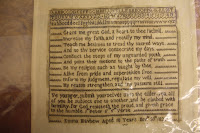
We then asked each student to pick a word from jar.

The students then worked with Jason to translate each of the words into sound, using Reaktor software to create a collective sound piece.
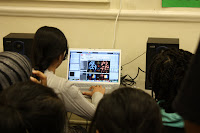
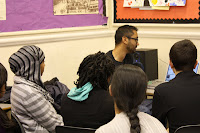
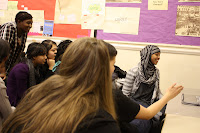
In the afternoon the students chose another two words from the jar, and we each created a sentence containing all three words. Lauren then worked with each student, so they stitched one of the words from each sentence, so we ended up with a selection of words that we used to create a collective stitched word collage.

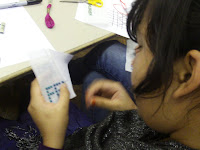

Many thanks of course to all the students for taking part, for making the day fun and for their excellent contributions to discussions and debates about embroidery and sampling. And to everyone at the school and the Guild for helping us to make the workshop happen, and especially to Hopal for all her hard work, helping to bring the partnership together. We're looking forward to developing the next stage of collaboration, building upon this first workshop.
The last month has been hectic with research, workshops, travelling and talks, but all good fun, with interesting collaborations and of course getting to meet and work with some great people of all ages.
A few weeks ago we were invited to run a one-day workshop in partnership with the Embroiderers' Guild and Central Foundation School for Girls in Bow, East London. This was a short workshop to explore how each partner might work together to develop opportunities for the students at the school to learn about both embroidery (historic and contemporary) and sound sampling. Also, for the students to think about the connections between different art forms and how they might use this inter-disciplinary approach to create new embroidered, sound, and spoken and written work. The Embroiderer's Guild is interested in how it can broaden its work with young people, particularly those who might not ordinarily get involved in its Young Embroiderers' activities.
For this workshop we also invited Lauren Steeper to get involved in working with the students. Lauren is a recent graduate for the BA Embroidery course at Manchester Metropolitan University. I was particularly impressed by Lauren's latest body of work, where she has created a series of text based hand stitched embroideries based on a system she had devised from playing the Lottery each week. We're delighted that Lauren has got involved in the project. You can find out more about that project and her other work at Lauren's blog: Lauren Steeper.
So Jason, Lauren and I were joined for the day by 8 students from the school, many of whom were also involved in a music workshop during the week. We started the day by looking at and talking about a group of historic 18th and 19th Century embroidered samplers from the Embroiderers' Guild's collection. This was the first time that any of the students had seen historical pieces of embroidery like these. It's great that the Guild loans out such pieces, so that you can get up really close and examine the stitches, the colour of the threads in their current state, and you also get a much better idea of how they've been made. The students were impressed by the fact that the pieces had survived and were in such good condition, and of course by how intricate many of the embroideries were, particularly given the age of the girls who had created them. We then had a very interesting discussion about who made them, the time and the context in which they were made, and the types of stitches used. This led onto discussions about samplers and sampling. One student commented that her dad says "a boy is just a sample of his father" - sadly we didn't have time to debate that one fully!!
To start the creative process, we had chosen the text from the following embroidery, typed it out and cut up all the words and put them in a jar, continuing our work with cut 'n' paste text.
We then asked each student to pick a word from jar.
The students then worked with Jason to translate each of the words into sound, using Reaktor software to create a collective sound piece.
In the afternoon the students chose another two words from the jar, and we each created a sentence containing all three words. Lauren then worked with each student, so they stitched one of the words from each sentence, so we ended up with a selection of words that we used to create a collective stitched word collage.
Many thanks of course to all the students for taking part, for making the day fun and for their excellent contributions to discussions and debates about embroidery and sampling. And to everyone at the school and the Guild for helping us to make the workshop happen, and especially to Hopal for all her hard work, helping to bring the partnership together. We're looking forward to developing the next stage of collaboration, building upon this first workshop.
Monday 1 November 2010
Subscribe to:
Posts (Atom)